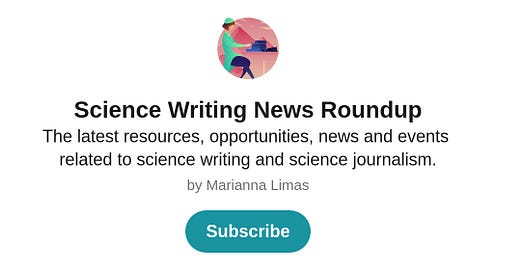✍️Science Writing News Roundup #22 (December 15, 2020)
Congratulations to the British Science Association’s Media Fellows! + A new curriculum for science journalism + Course: data visualization for storytellers + How open are we as science communicators?
Solutions Journalism: What is it and why should I care? “Solutions stories don’t celebrate responses to problems, or advocate for specific ones; they cover them, investigating what was done and what the evidence says worked and didn’t work about it, and why. They report on the limitations of a response.” Check out The Solutions Story Tracker’s science stories.
👏 News
Congratulations to the British Science Association’s Media Fellows! The fellowships provide a unique opportunity for scientists, clinicians and engineers to spend two to six weeks working at the heart of a media outlet:
Professor Monica Lakhanpaul, UCL, is placed with the BBC.
Dr. Clare Oliver-Williams, University of Cambridge, is placed with The Economist.
Dr. Martin Khechara, University of Wolverhampton, is placed with The Naked Scientists.
Dr. Priti Parikh, UCL, is placed with New Scientist.
Dr. Jerone Andrews, UCL, is placed with BBC Future.
Dr. Richard Colchester, UCL, is placed with WIRED UK.
🎄 Ideas
Rod McCullom on finding a beat — and finding the courage to stand out. “I’m always looking for research and stories that center on racial disparities, and I try to amplify the research and the stories that are already out there, because I don’t see a lot of people reporting on them,” says Rod McCullom, who spent a year at MIT as a Knight Science Journalism Fellow.
Spotlight on science writers: Mark Wilson is an award-winning wildlife photojournalist who has written about and photographed birds for more than 40 years! His book, Owling: Enter the World of the Mysterious Birds of the Night, was the winner for the 2020 AAAS/Subaru Book Prize in the Middle Grades category.
“Why we created a new curriculum for science journalism.” The next generation of science journalists face a particular need to develop skills to engage audiences and encourage science literacy, when science is often perceived as dry, overly complicated or uninteresting.
How open are we as science communicators? How many of us give conscious thought in our working day to what we trust and why? How often are we open to ideas, perspectives and knowledge that come from outside our usual circle of trust?
Writer offers advice on how journalists can respond to COVID-19 deniers. For Dana Smith, senior staff writer at Elemental, one of the biggest surprises this year has been the anti-science sentiment and the number of COVID-19 disbelievers among readers.
🎆 Resources
Data Visualization for Storytellers is a course for people interested in a rapid-paced, immersive experience in data visualization tools and techniques. This workshop is ideal for scientists, communication professionals, journalists, bloggers, educators, faculty, and those interested in becoming proficient in learning to communicate data with clarity and creativity.
What makes social and behavioral science newsworthy, and what can scientists and the media do to accurately report it? A new digital resource from the National Academy of Sciences offers expert insight for scientists and journalists on science communication.
Knight Science Journalism Program at MIT launches digital handbook for science editors, online fact-checking project. “We think lots of people can benefit from this handbook, but we really wanted to make sure it spoke to busy editors who might not have expertise in science journalism,” says Joshua Hatch, who co-edited the handbook.
SciLine asked scientists the following questions: What does the FDA’s analysis of the Pfizer vaccine tell us? How does publication of AstraZeneca’s early results add to our understanding of that product? How does the efficacy of the AstraZeneca vaccine compare to that of the Pfizer and Moderna candidates? Reporters can use the answers in news stories.
Journalists and fact checkers will soon have a dedicated support service to help them report on COVID-19 vaccines thanks to a global alliance of Science Media Centres (SMCs) and public health experts supported by the Google News Initiative.
New Book: The “Research Handbook on Communicating Climate Change” offers a vital knowledge base to address the urgency of conveying climate issues to a variety of audiences.
🌱 Opportunities
The Linnean Society, in partnership with the National Literacy Trust, are looking for established science writers for a new program: ‘Science Writers in Schools’. They encourage applicants from Greater Manchester, the North East, and Nottingham, in the United Kingdom.


🎬 Videos
What does it take to create a safe and effective vaccine? A virtual conversation with Dr. Amit Kumar, CEO of Anixa Biosciences (Science Writers in New York)
COVIDCalls: Science journalism in the pandemic with Laura Helmuth, Editor-in-Chief of Scientific American.
📅 Events
Reporting On and Living With COVID-19: The View of Four Latin American Journalists (Science Writers in New York, December 15, 2020)
The State of Inclusive SciComm: Building a Movement (Alda-Kavli Learning Center, December 15, 2020)
Join Google News Labs' Maggie Farley for a quick three-part tour of Google's new tools for journalists, with a particular focus on environmental and data journalism (December 15-17, 2020). To get the access link to watch any or all of the sessions, please email Dale Willman (daw2204@columbia.edu)
Webinar on COVID-19 Vaccine Confidence (National Academies, December 18, 2020)
Conversations on COVID-19: Vaccines in the News (Caltech Science Exchange, January 11, 2021)
✍️ Career opportunities
Health Care Editor, Axios, Arlington, VA or Remote, US
Assistant Editor, Innovation & Tech, Forbes, Jersey City, NJ
Content Lead, First Create The Media, UK
Biodiversity Writer, Vox Media, Remote
Climate Writer, Vox Media, Washington, DC
Biodiversity Editor, Vox Media, Remote
Newsperson, Science and Environment, Associated Press, New York, NY
More jobs 👉Science Writing News Roundup #21
👉 Don’t miss any updates from the Science Writing News Roundup:
Worried you missed something? See previous newsletters here. What would you like to see in the newsletter? Please send me your suggestions by replying to this email: sciencewriting@substack.com😃
If you liked this post, share it with your friends 💙






